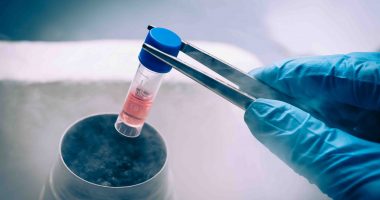- Proteomics International Laboratories (PIQ) has joined forces with QIMR Berghofer Medical Research Institute to combat oesophageal cancer
- The partnership will combine Proteomics’ Promarker platform and QIMR Berghofer’s biomarkers to develop a simple blood test
- The blood test will help to improve the detection of oesophageal adenocarcinoma, Australia’s most common form of oesophageal cancer
- When offered to people who are predisposed to oesophageal cancer, the test may help reduce invasive, risky and expensive endoscopies
- Proteomics International Laboratories closed 2.59 per cent in the green for 59.5 cents per share on Friday
Proteomics International Laboratories (PIQ) has joined forces with QIMR Berghofer Medical Research Institute to combat oesophageal cancer.
Specifically, the partnership will work together to battle oesophageal adenocarcinoma, Australia’s most common form of oesophageal cancer. Proteomics will use its Promarker platform to analyse and validate a panel of biomarkers which QIMR Berghofer have discovered.
The biomarkers in the blood are found to be associated with early stages of oesophageal adenocarcinoma. Combined, the Promarker platform and biomarkers will aid in the creation of a simple blood test which detects the cancer.
In addition to improving the detection of the cancer, it may also work as a preventative screening method. Upon development, the test will be offered to people with Barrett’s oesophagus.
Barrett’s oesophagus is a pre-malignant condition which increases a person’s risk of developing the cancer. Those who are predisposed to this are encouraged to undergo regular screening for pre-cancerous cells, which would be much easier with this blood test.
Associate Professor Michelle Hill, a medical researcher from QIMR Berghofer, led the team which discovered the biomarkers. She commented that the blood test currently under development could fundamentally change oesophageal cancer screening.
“At the moment, patients have to undergo an invasive endoscopy, with a camera passed down their throat to look for changes in the oesophagus tissue, and a biopsy taken. It’s uncomfortable for patients, requires specialist expertise, and comes with some risk of perforation and bleeding,” she said.
She went on to say that endoscopies are also very expensive, costing an average of US$2750 (approximately A$3810) in the U.S.
With more predisposed people using the blood test, the Proteomics-QIMR Berghofer partnership could help to reduce the number of invasive, risky, and expensive endoscopies.
Proteomics International Laboratories closed 2.59 per cent in the green for 59.5 cents per share on Friday.







